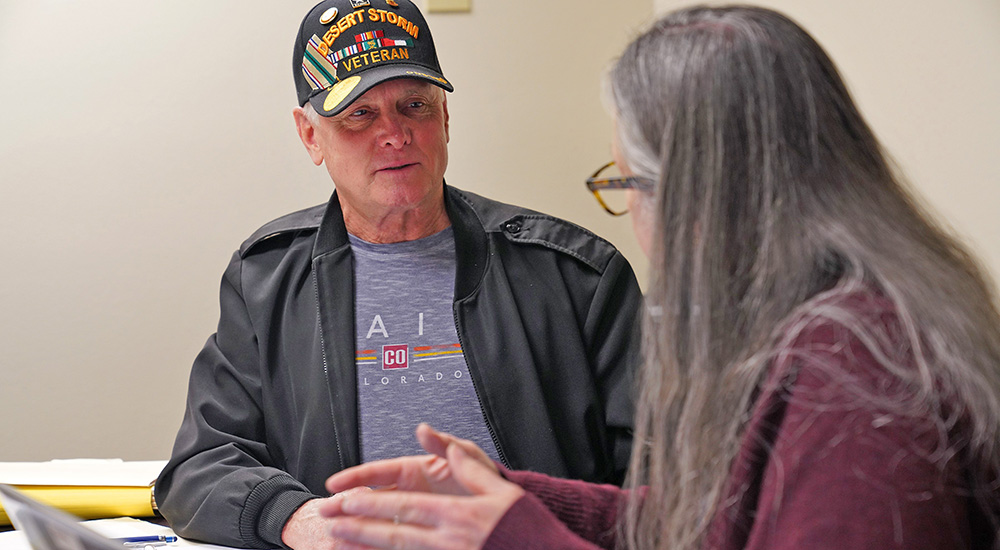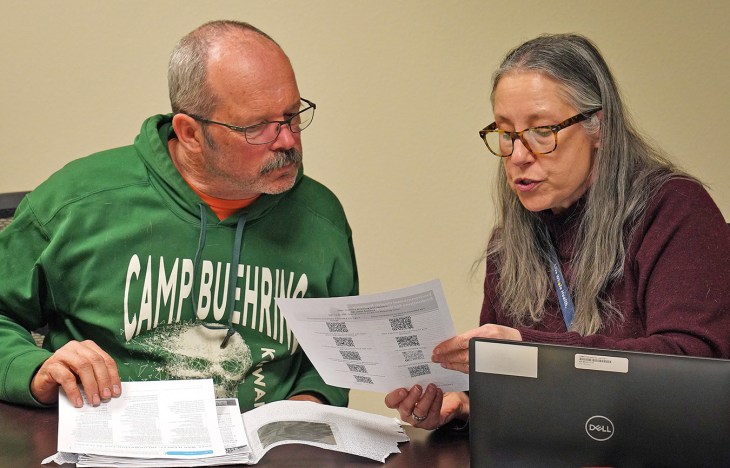VA Eastern Colorado has screened thousands of Veterans for toxic exposures.
Starting in November, toxic-exposure screenings were integrated into primary care at Eastern Colorado VA, which serves more than 100,000 Veterans in Denver Metro, Pikes Peak and rural areas. They are also occurring in specialty care.
“When the ground assault started, the horizon lit up. That’s how close we were,” said Army Veteran Ramon Navarro, about serving in Gulf War operations to free Kuwait from occupying Iraqi forces.
Navarro rolled into the Arabian Peninsula in 1991 to set up 400-bed evacuation hospitals. Plumes from oil fields and ordnance pits clouded the sun.
“We’re offering exposure focused care,” said Germaine Franciosi, after screening Navarro for toxic exposures following a benefits brief in the El Paso County Veterans Services classroom in Colorado Springs. Four nurses had arrived from VA.
Pictured above, Navarro completes his toxic-exposure screening.
Working in communities
With tens of thousands of Veterans screened in recent months, nurses are working in their communities to complete thousands more.
“We’re encouraging Veterans to let their providers know about their exposures,” said Franciosi, who trains VA nurses to complete the screenings, enabling them to identify and document toxic exposures with a focus on early diagnoses and treatments.
“If they were exposed to burn pits or Agent Orange, we can say, ‘Are you having trouble breathing?’ We will recommend when we think they should talk to their doctors and if it’s something they need to talk to them now or down the road. If the doctor sees concerning symptoms knowing the Veteran was exposed, they may do a biopsy earlier. It can change how the doctor plans that person’s care.”
Franciosi also coordinates training for other clinical staff who volunteer to support the outreach. During a Saturday standdown in April, together they called 1,000 Veterans.
Of the 37,000 Veterans screened since Nov. 7 when the clinical practice was established, nearly half resulted in at least one exposure concern. Enrolled Veterans will continue to get screened for toxic exposures at least once every five years.
The sweeping effort started three months after what’s likely the largest expansion of VA care and benefits. The PACT Act was signed into law Aug. 10. Under the new law, VA is recognizing more than 20 new presumptive conditions, including hypertension and various types of cancer and chronic respiratory conditions.
“This law helps us provide generations of Veterans and their survivors with the care and benefits they’ve earned and deserve,” said Director Michael Kilmer. “VA will not rest until every Veteran gets the toxic exposure-related care and benefits they deserve.”
“They protected us, now we must protect them.”
A Marine Corps mortarman during the Gulf War, Dennis Levings remembers a time when oil fell from the sky. Plumes blocked the sun. Days seemed darker than nights as persistent fires powered an orange glow across the dunes.
“I’ve done all this stuff, got injured, got broken and had treatment. But now it’s developing into something more. So why not get the care and compensation? We need to spread the word. You’ve done this, you’ve earned this, you deserve to get this. Why wait?,” he asked.
Veterans who apply for PACT Act-related benefits before Aug. 10 will have benefits backdated to Aug. 10 last year—the day the bill was signed.
PACT Act links
VA began granting benefits for terminally ill Veterans with a presumptive condition Dec. 12, ahead of officially starting PACT Act-related claims processing Jan. 1. Of the first 200,000 claims completed for Veterans and their survivors, 80.5-percent were approved, according to the VA PACT Act performance dashboard April 14.
Franciosi says it’s about fulfilling the VA mission. “The most important thing is Veterans get the care they need. They protected us, now we must protect them,” she said.
To apply today for benefits or learn more about PACT Act claims and care, call 1-800-MYVA411 or visit the PACT Act website.
For more information on how to apply for VA health care, including the documents needed to determine eligibility, visit the “How to apply” website.
Topics in this story
More Stories
Bob Jesse Award celebrates the achievements of a VA employee and a team or department that exemplifies innovative practices within VA.
The Medical Foster Home program offers Veterans an alternative to nursing homes.
Watch the Under Secretary for Health and a panel of experts discuss VA Health Connect tele-emergency care.








I did not see any information on Heavy Medal exposure such as Lrad on this site.